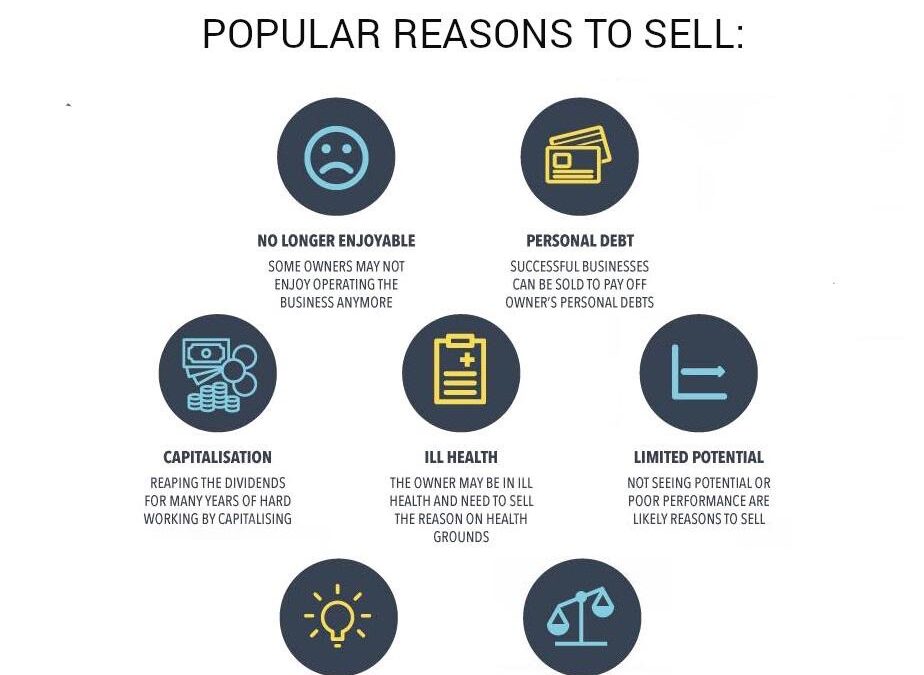
by theEmother | Feb 1, 2021 | business ideas & thinking, EXIT execution, exit strategy, Finish Unfinished Business, how to sell a business, Sell Your Business, SELL your Mother of a Business
As explored in “Business is Personal; Small Business and Owners – a Love Letter” earlier this year, Small Business can be the most wonderful and fulfilling business-life partner you’re looking for.
And sometimes it is not…
When it comes to business, we like to think we are strategic and thorough in our approach. We want to believe we know where our talents and opportunities lie, we spend years (and a fortune) on gleaning advice and (maybe) attending training and professional development, we devote all our collective energies to progressing, keeping a vigilant and jealous eye on the progress of our rivals.
Consequently, when (as a business owner) we’re ready to exit, it should be the easy bit.
We don’t expect there to be any particular complexity in this part of the plan. We’ve decided we want to relax and have fun, and envisage the only obstacles to such goals might be finding the right buyer, so that the business is sold for a song. We adopt an almost laissez-faire, she’ll-be-right-mate attitude, and readily take up suggestions of others without rigorous scrutiny, sometimes, without thinking about things too much at all really.
What becomes painfully obvious when we do get serious is that is what we’ve missed for many years. We fail to note that our business is so much more that just-a-business and not worth nearly as much as we think we deserve, because we insist on being haphazard and even slow about the planning and execution of the Exit. We stick to being guided by internet searches, hearsay, unlearned opinions and muddled instinct when we should be harnessing reason and independent advice from those who play in this space. We end up being a lot more miserable than we might be because we have not taken this part of the business lifecycle more seriously.
And we don’t because we assume that what worked for others will work for us too.
It doesn’t readily occur to us to take our unique situation, both in terms of the business itself and what it means to us and our family and our staff and our suppliers and our customers and our community overall, into account. But most of all, personally and individually.
We’re always looking for clues as to when to even acknowledge the question of Exiting the Business in the first instance, and then when to think about actioning it. Here are 7 to get started:
- No Longer Enjoyable: some owners may not enjoy operating the business any more.
Whilst this might seem simplistic, it’s not. If we’re finding it’s a struggle to do what we once did with joy – why? is it the business itself? is it the people we are working with? is it what’s happening at home impacting on our workplace? Have we found something new to tickle our fancy? Are we just over it? Do we want to leave a legacy that is represented by our business, continuing well into the future, but want someone else to take the reins?
- Personal Debt: successful businesses can be sold to pay off owners personal debt.
Have we found ourselves in a position where we’re staying awake at night worrying about the amount of debt we’re carrying and/or meeting the repayment regime? Is the business the one asset that could be sold that will address this, freeing us up from the burden and for our next add-venture? Is it a choice between the business or the family home?
- Capitalisation: to reap the dividends for many years of hard working by capitalising.
“Capitalisation of profits implies plowing the money back into the business, or keeping it on the balance sheet for some future, yet-unidentified opportunity, or to return some or all of the profit to its shareholders, in the form of cash dividends or new shares” (investopedia.com) Do we really want to sell, or just be able to get some hard-fought-for funds out? Is selling shares a way to do this, and to eventually move the business on over time? Is it a way to at least share the load?
- Ill Health: the owner may need to sell on health grounds.
We’ve had a health check and the feedback is not what we wanted to hear. What do we do now? Do we put the business on the market tomorrow? Do we think all will be right and not worry about it? Do we start making calls to work out what options we have over what timeframes? Do we remonstrate ourselves for not having the business in a more saleable shape?
- Limited Potential: not seeing potential or poor performance.
What future does our business have? Is our business ready to take on new initiatives? Is it in an industry on the decline or incline? Can it be reworked, repurposed, recycled, or refurbished? Do we know what to do to bring it into the 21st century but don’t have the energy or the care factor? Do we not know what to do, and not really sure which way to turn or who to pay attention to? Is this as good as it’s going to get for the foreseeable future, and therefore now would be the time to move it on before there’s more deterioration?
- New Project: owners may want to free up time to pursue a new project in mind.
Freedom plays a big part in thinking about Exit. If we didn’t spend all our time running our business, what would we do instead? What could we do instead? What have we learnt through being a business owner that we can now apply to another path? What angle in our existing business have we discovered that excites us more? Would we actually prefer to be doing something completely different?
- Work/Life Balance: balancing work with life, or maybe even retirement.
Maybe we’ve just had enough…
We want more balance, whatever this means for us.
We don’t want to die with our particular appetites and intense sensations tragically unexplored.
If we use ourselves as our point of reference, what would our life without the business look like? What would we talk about?
How would we identify ourselves? to others?
What have we enjoyed in the past and might we recreate?
What might we learn to say no to and contrastingly, to emphasise going forward?
What’s becoming evident to us as the Business Owners that we are, is that what’s been happening of late (or for the last number of years) cannot continue. Even if we’ve done well, we probably can’t just shut the business down without affecting and upsetting many others, and maybe we don’t really want to do this either. So what are the real options?
Selling the business is definitely one…
If any or all of these possible considerations are resonating, it’s time to work out what to do. If 2020 has taught us nothing else, it has highlighted how something can come out of nowhere and completely disrupt our world, whether we’ve been fabulous folk, excellent at business, or otherwise.
Let’s put this learning to good use…
Call me +61 3 8560 0524
by theEmother | Apr 10, 2014 | build a Mother of a Business, exit strategy, Finish Unfinished Business, how to sell a business, Sell Your Business, SELL your Mother of a Business, so you think you're in business, start with the end in mind, the business model

The most interest over the last weeks has been “When Is the Right Time to Sell?”
The answer to that question moves amongst how-long-is-a-piece-of-string and who really knows. Nonetheless, there are a few prime clues that I have explored with you over the past number of posts…
In my experience, the price discussion causes more angst than any of the preceding steps.
What is being addressed here is:
- not what you’ve invested
- not what hours you’ve worked
- not what you think it’s worth
It is instead about the realities, at this point in time, in regard to the calibre of the asset you are taking to market.
And this is where the disconnect invariably lies.
When appraising a business, we always come up with a most “Likely Price Range”, similar to real estate. This range is based on the quality of the previous steps and how well you can prove them.
Certainly part of our analysis is we ask what price you want.
We then ask how was this price arrived at.
And what is it based on.
This will usually give us clues as to how realistic your price is and how likely we are to be able to sell it at the price you want.
In most cases, advice has been received from parties not aware of current market forces and pricing, which therefore creates a more nonsensical starting point. It then takes time to get real. Resulting in the shop around in the hope of getting a better price.
A word of caution here… be very sure about not only whom you’re getting your advice from, but also marketers passing as brokers. When they say they will put your business on the market for what you want and you have to pay a LOT of money for the privilege upfront – STOP! Come and see me first. There are many a disenchanted business owner around, who has paid thousands and thousands of dollars only to never get a lead and to never hear from the marketer/broker again. Even when they call the office number provided!
Seriously, if you want to get the kind of price you envisage, start doing the things noted in the Steps through to this one.
by theEmother | Apr 9, 2014 | business ideas & thinking, exit strategy, Finish Unfinished Business, how to sell a business, Sell Your Business, SELL your Mother of a Business, Sellability Score, so you think you're in business, start with the end in mind, the business model

The most interest over the last weeks has been “When Is the Right Time to Sell?”
The answer to that question moves amongst how-long-is-a-piece-of-string and who really knows. Nonetheless, there are a few prime clues that I will explore with you over the next number of posts…
Through using the Hurst Partners sellabilityscore.com.au and getting into discussions with business owners, many of them believe the act of selling their business is similar to passing the baton in a 400-metre relay: once you’re finished running, you get to relax.
In reality, buyers may insist that you stay on for a transition period – anywhere from six months to five years, depending on the size of the transaction – during which time you continue to work in your business to help the buyer capitalise on the investment they’re making.
THE Question
At some point in the process of selling your business, a prospective buyer will ask you – usually quite casually – “Why do you want to sell your business?”
Buyers ask THE question to evaluate how likely and willing you are to stay on or if you already have one foot out the door.
Obviously you don’t want to lie, but there is a right and wrong way to answer THE question. Answers like “I want to slow down a bit” or “I want to travel” or “we’ve got a baby on the way and I want to spend more time at home” communicate to a potential buyer that you plan on winding down when they take over. However, what they may want to hear is your intention to help them realise the potential locked inside your business.
Here are some suggested responses based on your age.
If you’re under 40, you clearly aren’t ready to “retire” so you need to communicate that you see an upside in merging your business with theirs:
“In order for us to get to the next level, we need to find a partner with more sales people, distribution, geographic reach, capital or whatever the partner brings to the table.”
If you’re between 40-55 years old, most people will understand the need to sure up your personal balance sheet:
“I’ve reached a time in my life where I want to create some liquidity from the value I’ve created so far and at the same time I want to find a partner who can help us get to the next level.”
If you’re over 55, you can start to talk about retirement, but you want to make sure you communicate that you still have lots of energy and passion for your business.
“I’m at a stage where I need to start thinking about retirement. It’s a long way off yet, but I want to be proactive.”
Rehearse your answer to THE question so it becomes a natural response when you are inevitably asked THE question.
by theEmother | Apr 8, 2014 | build a Mother of a Business, exit strategy, Finish Unfinished Business, how to sell a business, Sell Your Business, SELL your Mother of a Business, so you think you're in business, start with the end in mind, the business model

The most interest over the last weeks has been “When Is the Right Time to Sell?”
The answer to that question moves amongst how-long-is-a-piece-of-string and who really knows. Nonetheless, there are a few prime clues that I will explore with you over the next number of posts…
In sale conversations, there is much talk about the “potential”.
“A new owner can do this, a new owner can do that, which will result is a windfall etc etc”, business owners say.
Question #1 from a buyer:
“If there is such opportunity, why hasn’t it been done already?”
Question #2 from a buyer:
“Why should I pay for the privilege of doing something that has yet to be done? Ie there’s no proof that it will in fact work…
The much-learned colleague of mine always says:
“What a buyer buys is profit, the reason they buy it is the potential.”
Not only do you need to sell your business as being robust from a “scorecard” point of view, you also need to show that there is still some life in the old dog.
This is demonstrated by talking about:
- What you would have done, but haven’t? And why?
- What you could have done? But haven’t? And why?
- What are the trends in your industry? And what does that mean for your business?
If you want to be paid for potential, then start installing some of the initiatives you are prepared to highlight and show a measurable increase in the metrics and the financials. That way, it’s not just all-talk!
by theEmother | Apr 3, 2014 | build a Mother of a Business, exit strategy, Finish Unfinished Business, how to sell a business, Sell Your Business, SELL your Mother of a Business, so you think you're in business, start with the end in mind, the business model

The most interest over the last weeks has been “When Is the Right Time to Sell?”
The answer to that question moves amongst how-long-is-a-piece-of-string and who really knows. Nonetheless, there are a few prime clues that I will explore with you over the next number of posts…
Ah yes, the all-important “scorecard”!
Whilst the metrics and the financials definitely form the basis of the sale, they are not usually the only reason that the sale goes ahead. Yes, they are used as first pass, but they are not always the only reason that a potential Buyer says yes or no.
As this information is asked for at the outset, best get it ready as soon as possible. Indicative of the type of information required is:
- Background to the business
- Financials (accountant-prepared profit and loss and balance sheet) for last 3 years
- Supply/Agency Agreements
- List of Top 10 Sales/Customers (for last 3 years; no names)
- List of Employees (incl. owners) – Role, salaries, history
- List of Licensees/Franchisees/Stores
- List of creditors and debtors for 30, 60 and 90 days (total)
- Online Statistics (Google Analytics)
- Lease/Property details
- Outline Owner’s involvement
- Any information that will likely impact on the future performance of the business
What is effectively being asked for here is proof of the numbers. If you’re unable to produce such reports, then think about what you can use to prove what is being claimed. Whilst a spreadsheet or two can suffice, there has to also be bank statements or PayPal records or clickbank numbers that can substantiate the spreadsheet.
To not do this opens the question of “what is for sale exactly?”
Until you can tell the metrics and financials story, then the business may not be ready to take to market after all…






